
DOING IT TOUGH IN HARD TIMES
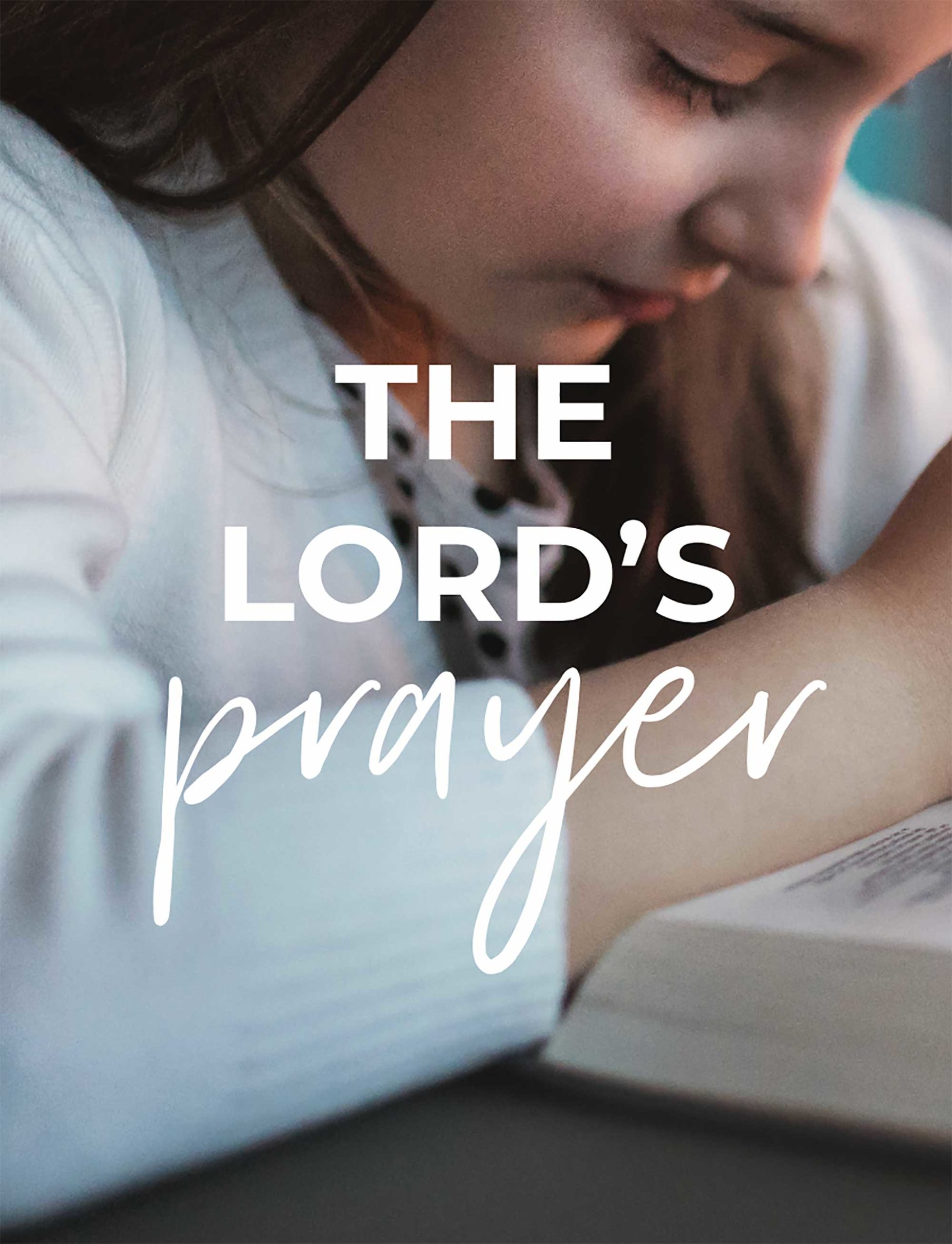
The second part of the Lord’s Prayer focuses on our human needs.
Jesus directs us to seek God for who he is – the one who supplies all our needs.
We cannot demand that God meets our needs, but we can ask him.
Especially in lands of abundance like Australia and New Zealand, we have so much that we can easily take God’s goodness to us for granted.
But there is no good thing that we enjoy that God did not provide.
This part of our prayer acknowledges our dependence on God.
It is important to take time in order to nurture our relationship with him, and to remember first his goodness and desire to care for us.
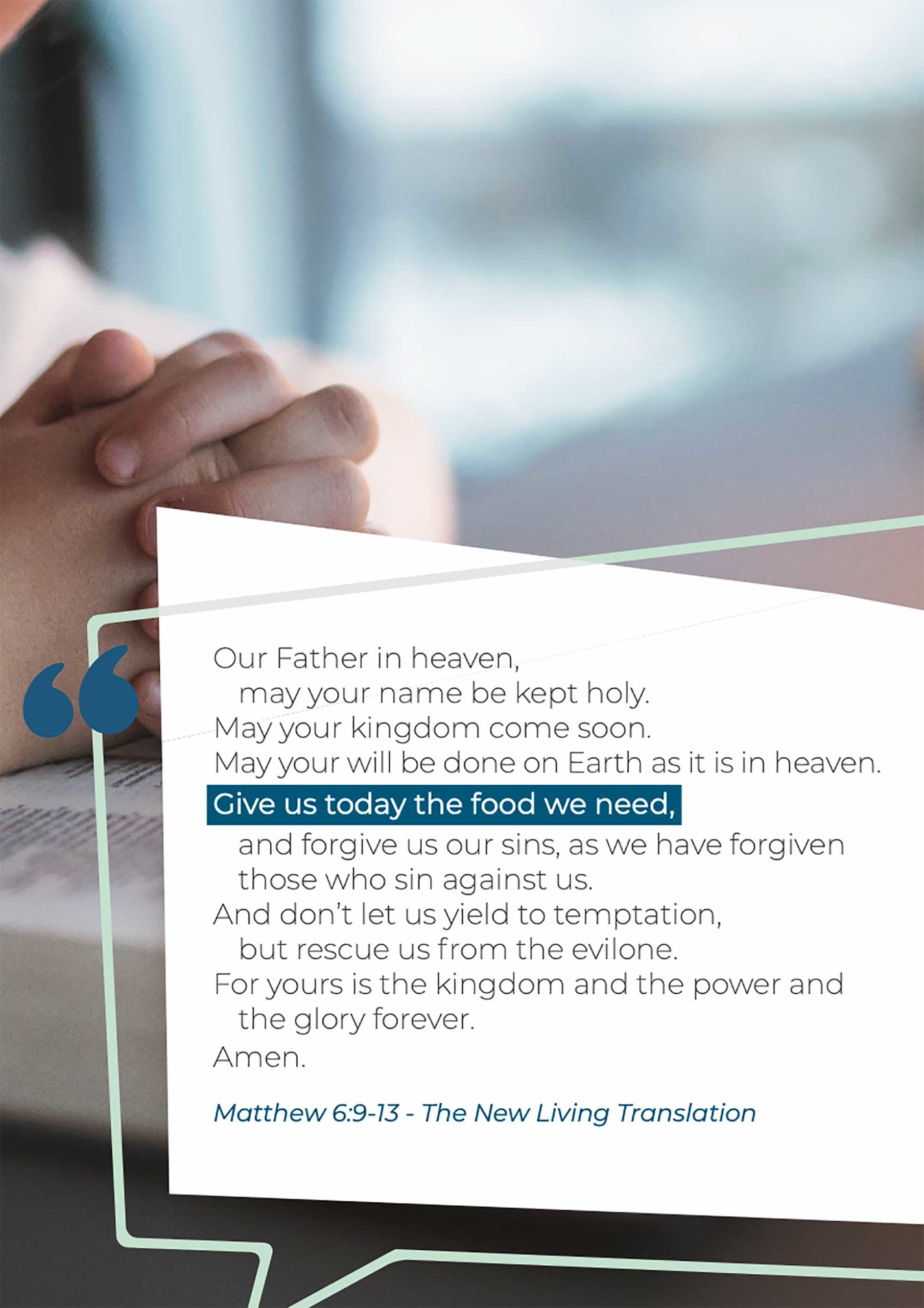
MY STORY
GENEROUS GOD

In providing for our physical needs, God is not stingy.
In fact he is very generous.
And he doesn’t have favourites or restrict his blessings to race, gender, age or religion – or whether you believe in him or not!
He [God] causes his sun to rise on the evil and the good, and sends rain on the righteous and the unrighteous. Matthew 5:45
The fact that millions are starving cannot be blamed on God.
The earth produces a huge harvest from God’s rain and sunshine.
But politics, greed, and even human nature itself, cause some countries to suffer from affluenza while others starve.
We should keep in mind the reality that we are part of a much larger drama going on behind the scenes.
It may be true that in our own self- centredness and immaturity we often only turn to him when we find ourselves in a predicament, and treat him something like an insurance policy.

WE MEAN MORE TO GOD THAN WE THINK!
Think about this – Jesus tells us that our heavenly Father knows before we even ask.
. . . your Father knows what you need before you ask him. Matthew 6:8
We often forget the love he has poured out for us.
Psalms 139:17-18 describes this as –
How precious concerning me are your thoughts, O God! How vast is the sum of them! Were I to count them, they would outnumber the grains of sand.
This is saying that God puts more thought into his creations than there are grains of sand on all the shores of every ocean.

Here are some more thoughts from this chapter
For you created my inmost being; you knit me together in my mother’s womb.
I praise you because I am fearfully and wonderfully made; your works are wonderful, I know that full well.
My frame was not hidden from you when I was made in the secret place.
When I was woven together in the depths of the earth, your eyes saw my unformed body.
All the days ordained for me were written in your book before one of them came to be. Psalm 139:13-16
Jesus also shares this sentiment when he said –
What’s the price of two or three pet canaries?
Some loose change, right?
But God never overlooks a single one.
And he pays even greater attention to you, down to the last detail – even numbering the hairs on your head!
So don’t be intimidated by all this bully talk.
You’re worth more than a million canaries. Luke 12:6-7 (The Message)
This being the case, we need not hesitate to bring our personal needs to God. He delights to meet them as a father does with his children.
We are complex beings.
The Bible describes us as having three parts to our nature.
Each part has its separate needs and each affects the others.
The Apostle Paul labels them – body, soul and spirit. (1 Thessalonians 5:23)
Jesus addresses these in the last three requests of the Lord’s Prayer. Give us today the food we need – is a request for God to provide the needs of our body in its physical form.
Get Involved –
How do you see God involved in your life?

Keep your wants, your joys, your sorrows, your cares, and your fears before God. You cannot burden Him; you cannot weary Him. He who numbers the hairs of your head is not indifferent to the wants of His children.
Prayer p.11
OUR BASIC NEED – STAYING ALIVE!

At a rock bottom level, this prayer is simply a basic request for God to keep us alive.
Some translations of this prayer say – Give us this day our daily bread. (See Matthew 6:11)
The word bread, as it is used here, has a much wider meaning than mere food.
It extends to all those things that we need to stay alive.
Besides food and water, it includes such material necessities as – a place for us to live, garments to keep our bodies warm, and protection from everything that might threaten our health and existence.
This request for food – bread – is not a prayer for abundance or luxury.
It is a prayer asking only for basic necessities.
Jesus guarantees that, at the bare minimum, there will always be enough.
On several occasions, Jesus performed an outstanding miracle by feeding enormous crowds of people who had followed him to a remote place.
Instead of laying out a menu of choice meals and fine wines, he fed them a simple meal of fish and bread. (See Mark 6:30-34)
With our high Western standard of living, it’s easy to lose the meaning of basic.
In Jesus’ day, most people could not be sure that they would have enough food for the next meal.
So this request was relevant to them in their immediate situation.
Another Biblical example is when God’s followers were delivered from slavery in Egypt.
He led them on a journey through a desert for forty years where food was not readily available.
Under these circumstances, God promised to supply their needs.
The LORD said to Moses, I will rain down bread from heaven for you. The people are to go out each day and gather enough for that day. The people of Israel called the bread manna. It was white like coriander seed and tasted like wafers made with honey. Exodus 16:4,31
On the very day they finally entered the new country in which they were to live, the daily supply from heaven each morning ceased, because they were then able to gather their own food.
By that time they had learned to trust God’s daily provision for their needs.
Get Involved –
How do you see God involved in your life?
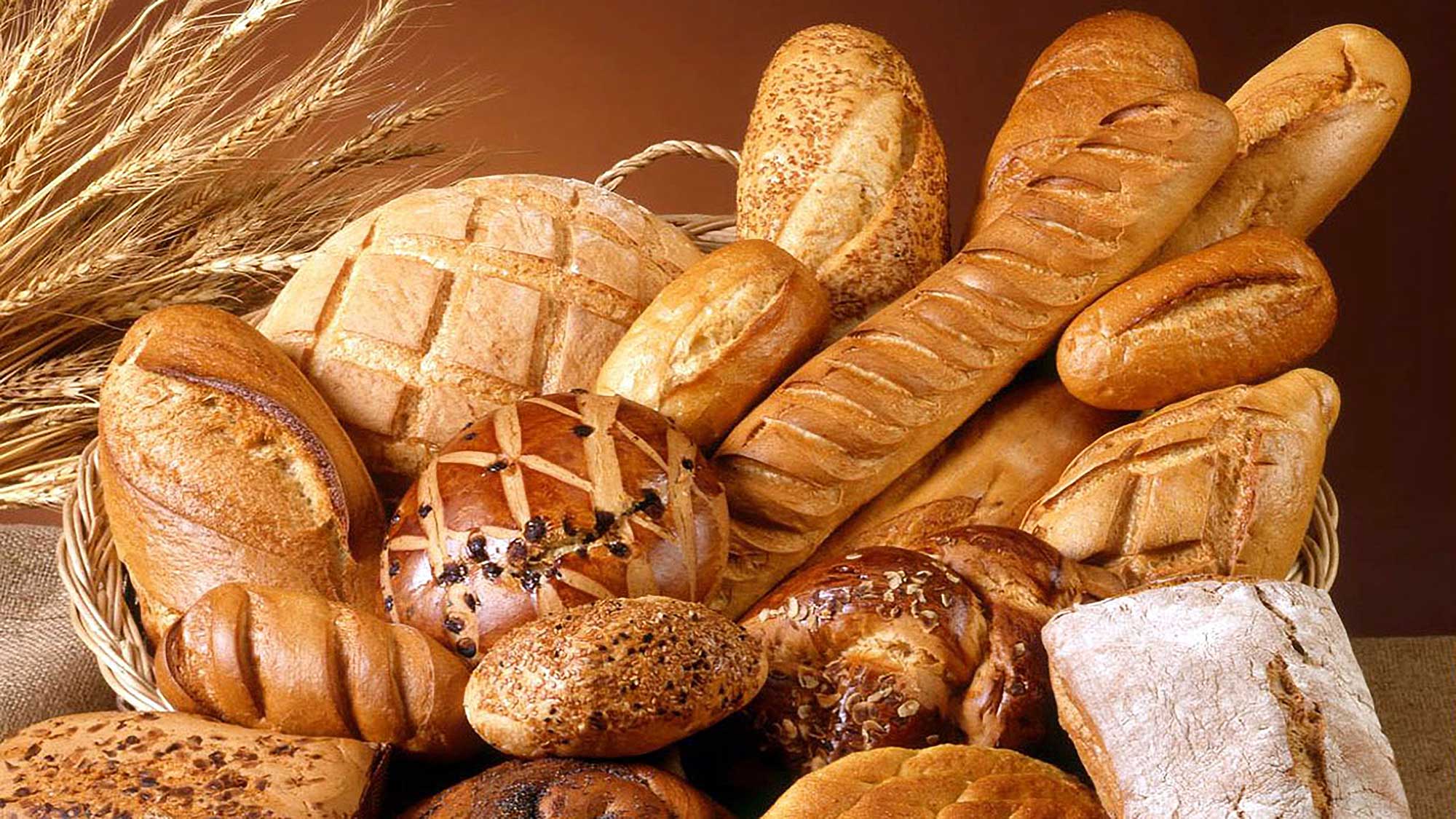

Some have wondered why God would want us to ask for such basic needs.
If he already knows what we need beforehand, why doesn’t he just supply those needs automatically?
Such a question overlooks our deeply ingrained tendency to take him for granted.
It also misunderstands the longing in his heart for us to remember him on a regular basis.
He doesn’t keep back food from us if we don’t ask, but he knows that approaching him habitually for our basic needs raises some important questions for us on a daily level.
It keeps us in touch with our Father – the one we are ultimately always dependent on.
He is also the one who, at the same time, invites us to develop intimacy with him.
He already owns all the resources necessary to meet our needs.
God says –
If I were hungry I would not tell you, for the world is mine, and all that is in it. Psalm 50:12
Asking him to meet our basic needs on a daily basis is like presenting a new cheque every day and asking him to honour it.
We have the assurance that he always has enough to provide our needs, but he chooses to do it this way in order for us to develop a deepening relationship with him.
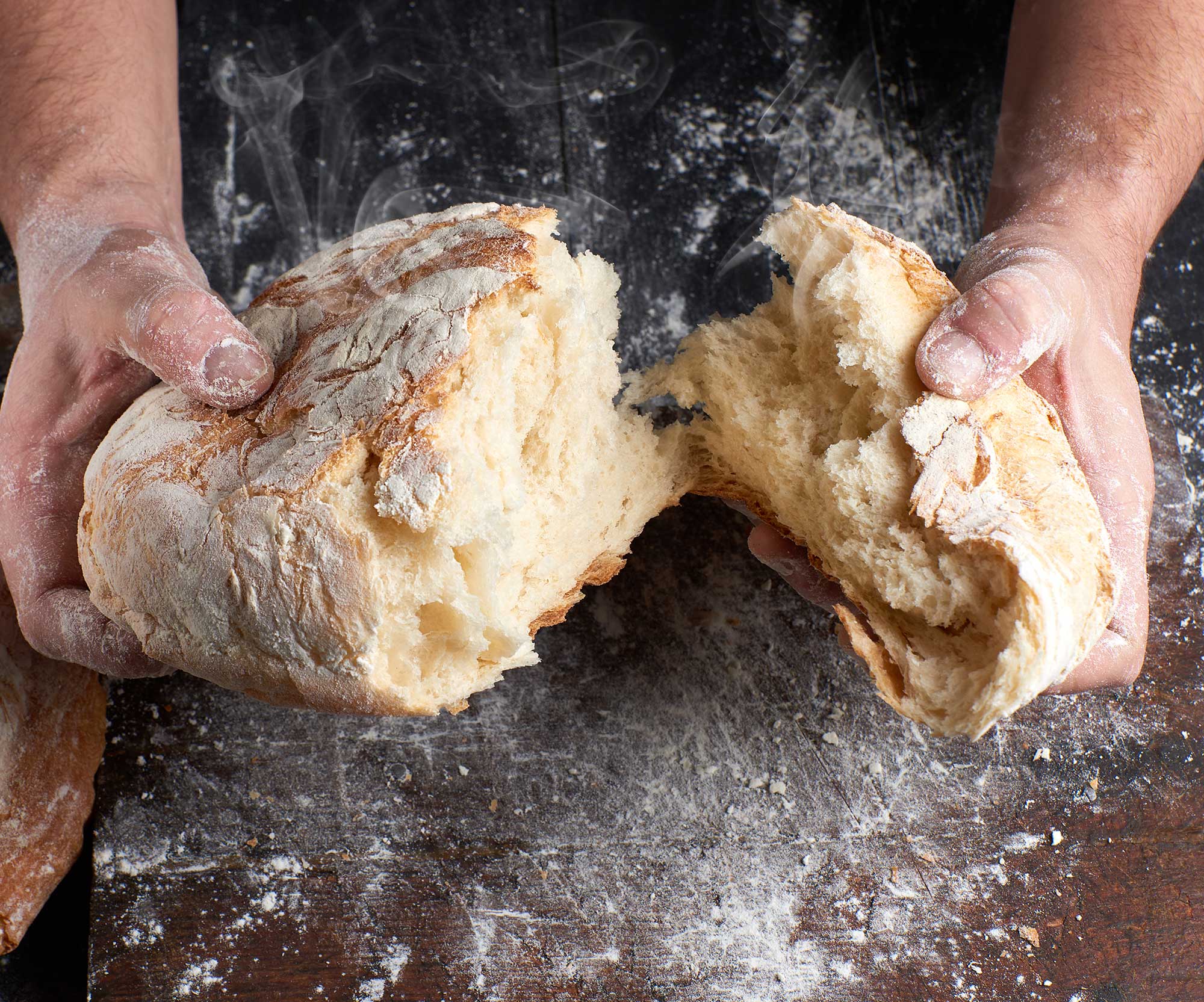
It is a part of God’s plan to grant us, in answer to the prayer of faith, that which He would not bestow did not thus ask.
– Prayer p.47
JESUS AND FOOD
The human body is important to God.
In the Genesis account, human beings were the pinnacle of all that he created. And what’s more
God saw all that he had made, and it was very good. Genesis 1:31
His awareness of our need for food was laid out right at the beginning when he said –
I give you every seed-bearing plant on the face of the whole earth and every tree that has fruit with seed in it. They will be yours for food. Genesis 1:29
In order to show how important the human body is, God himself became one of us – he took on a human body.
He intentionally chose to be born in the small Palestinian village of Bethlehem a little over 2,000 years ago, into a family that existed on the edge of poverty.
As such, Jesus experienced all the basic needs that human beings have to face for survival.
He knew what it was like to ask his Heavenly Father for a daily provision of food.

God saw all that he had made, and it was very good. Genesis 1:31

When Jesus began his ministry at the age of thirty, he spent forty days in a desert fasting.
That is, he drank water but ate no food.
He did this in preparation for the work of the Messiah that lay ahead of him.
An empty stomach for a limited period of time is commonly known to provide a clearer mind for prayer, and to understand God’s will.
At the end of that period Jesus was understandably very hungry, and Satan came to him, tempting him to turn stones into bread.
He could have easily done that.
But as a man, he chose to depend on his Father in heaven to provide him food, modelling for us an attitude of dependence on God to provide our needs.
On another occasion, a man asked Jesus if he could join the group who had become his followers.
Jesus’ response seems puzzling to many –
Foxes have holes and birds of the air have nests, but the Son of Man has no place to lay his head. Matthew 8:20
Jesus was spelling out to him that becoming his follower had no guarantees of prosperity.
All Jesus had ever promised was the basics of life – just enough to live on and serve God.

WHY WORRY?
Do you ever worry that you won’t have food to eat?
Jesus says –
Therefore I tell you, do not worry about your life, what you will eat or drink; or about your body, what you will wear.
Is not life more important than food, and the body more important than clothes? Look at the birds of the air; they do not sow or reap or store away in barns, and yet your heavenly Father feeds them.
Are you not much more valuable than they? Who of you by worrying can add a single hour to his life?
And why do you worry about clothes? See how the lilies of the field grow. They do not labour or spin.
Yet I tell you that not even Solomon in all his splendour was dressed like one of these.
If that is how God clothes the grass of the field, which is here today and tomorrow is thrown into the fire, will he not much more clothe you, O you of little faith?
So do not worry, saying, What shall we eat? or What shall we drink? or What shall we wear?
For the pagans run after all these things, and your heavenly Father knows that you need them.

Seek first his kingdom and his righteousness, and all these things will be given to you as well. Therefore do not worry about tomorrow, for tomorrow will worry about itself. Each day has enough trouble of its own. Matthew 6:25-34

Jesus always valued the human body as an exceptional part of God’s creation.
Even when he was raised from the dead, he remained in his human body. (See Luke 24:36-43; Philippians 3:20-21)
If you choose to become a follower of Jesus, he tells us that God himself in the person of the Holy Spirit comes to live in your body.
He calls our body a temple in which he dwells. (See 1 Corinthians 6:19)
It is through his indwelling that we are able to hear him sharing his thoughts with us. (See Romans 8:16)
It is through his indwelling that we are able to hear him sharing his thoughts with us. (See Romans 8:16)
He helps us to bring about positive life changes, and to break bad habits that are self-destructive in nature.
God has committed himself to provide us with these basic necessities of life for several reasons.
He knows that if we don’t have them we are unable to focus on our deeper need for relationship with him and other people.
He is also aware that in order to manage the spiritual battles, our physical needs must be met.
A PRAYER OF GRATITUDE
Many people pray before they eat.
Jesus did.
Then he took the seven loaves and the fish, and when he had given thanks, he broke them and gave them to the disciples, and they in turn to the people. Matthew 15:36
It is not some religious ritual you have to do.
But when you realise that God is the real provider in every harvest, giving thanks is a simple and beautiful way of thanking God for his goodness to us in providing our food.
This giving thanks before we eat is sometimes called saying grace.
Grace exists when you receive something good that you don’t necessarily deserve, and often don’t ask for.
Saying grace, or giving thanks, is a beautiful way of personally connecting with God during the day.
It is as simple as closing your eyes – to shut out the world around you and to focus on God, bowing your head – a token of respect and honour, and saying – thank you.
It is not a formal prayer.
Here is an example –
Father in Heaven, thank you for this food today. I accept it as a blessing from you. Amen
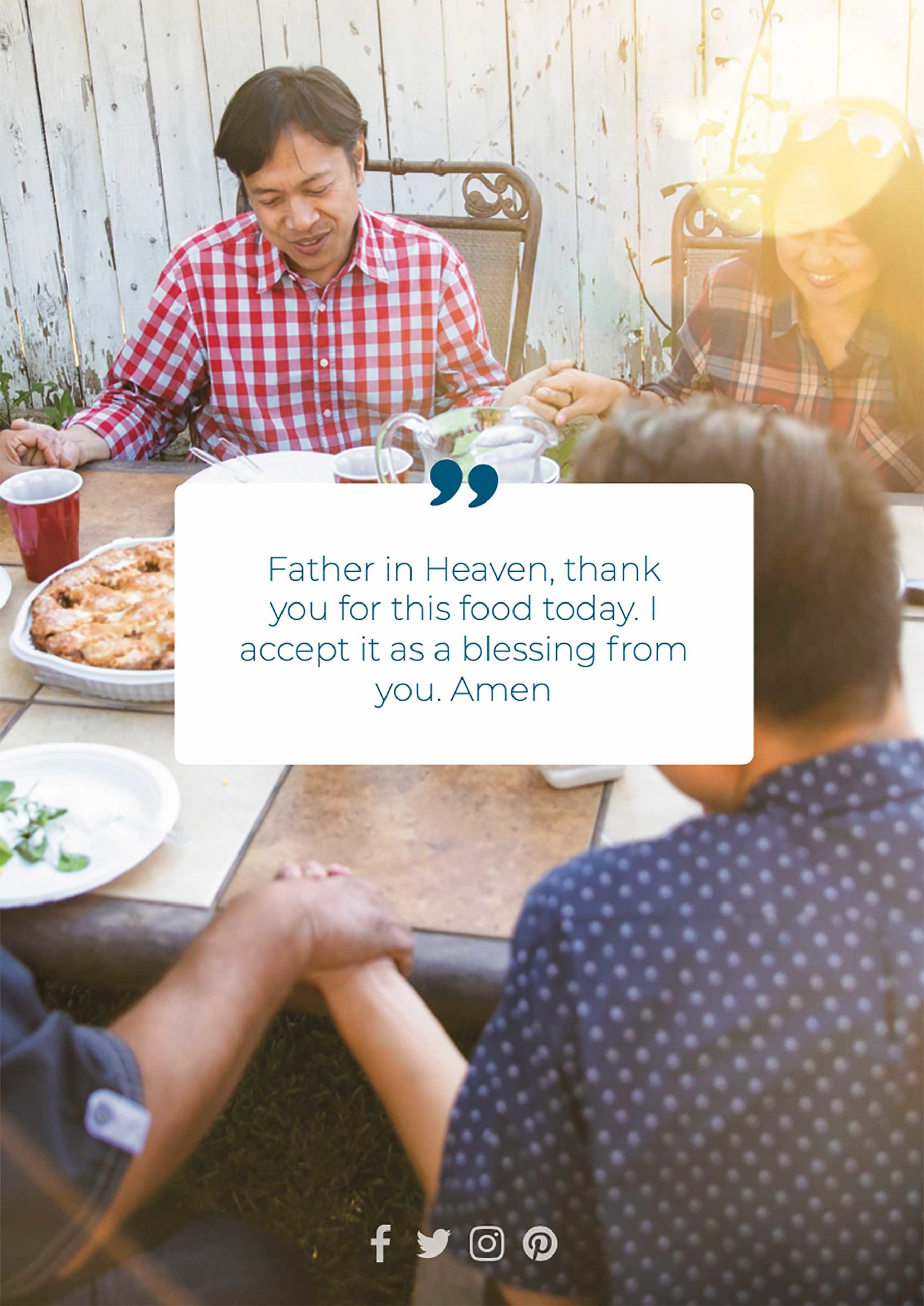
Get Involved –
If you are not in the habit of saying grace, why not start today? Next time you eat, just thank God for the food you have. It’s that simple.
Try writing down a simple grace you can say to God.
DOING IT TOUGH IN HARD TIMES
